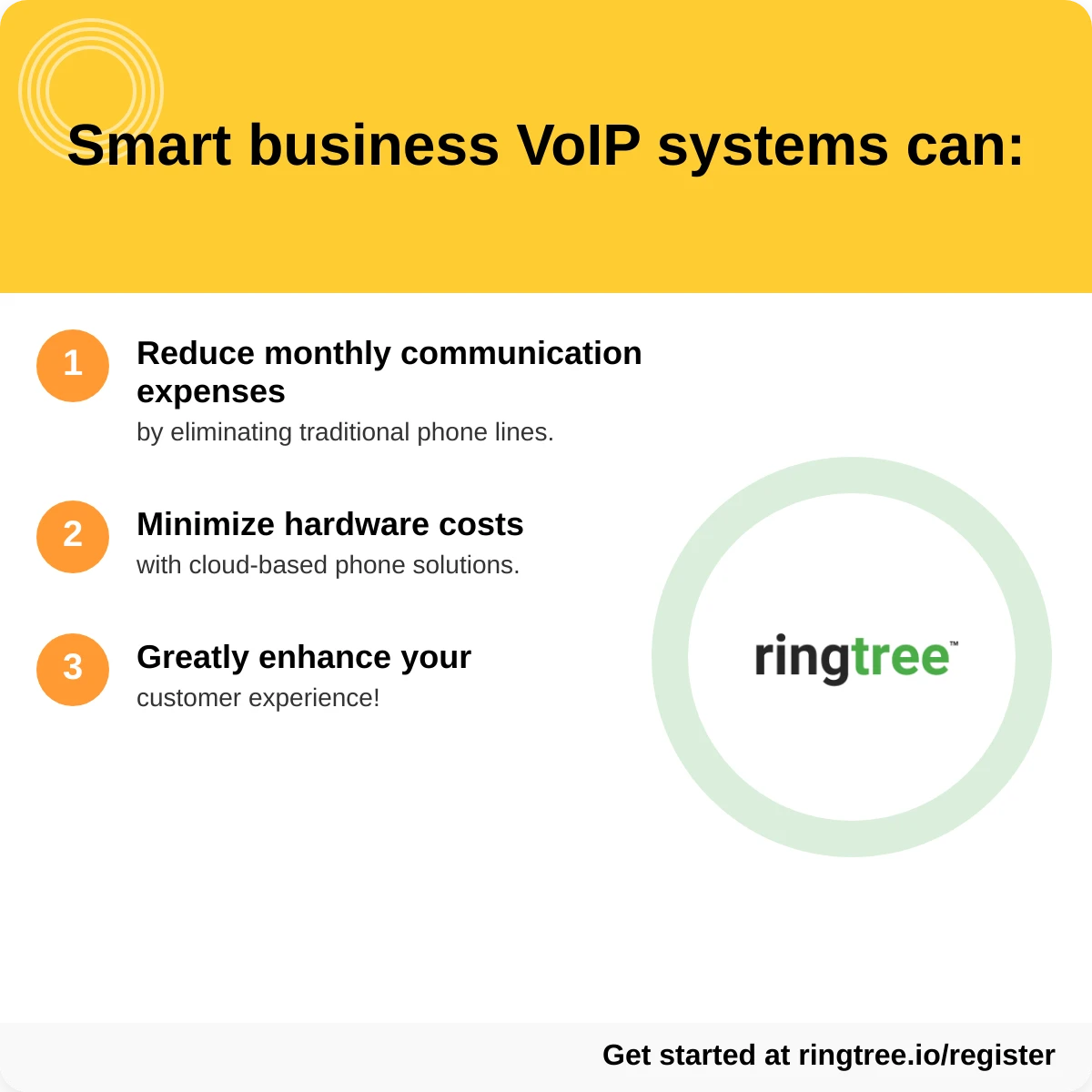Listen to this article
Introduction
What is a Virtual Phone System?
Virtual Communication Tools and Channels
- Virtual or cloud calling: The virtual phone is the most basic form of digital communication. This feature works by using Internet service to make or receive calls.
- Virtual texting or SMS: Use the Internet to send or receive text messages. While service providers often include this feature with cloud calling, it might sometimes be available as a service add-on.
- Video and audio conferencing: Some VoIP providers also let business customers purchase video and audio collaboration software in addition to virtual phone service.
- Chat: Depending on the service, you may be able to make chat support available to your customers or use chat features to communicate with other team members.
- Voicemail: In the event a call gets missed or customers call after hours, many virtual phone services provide a digital voicemail tool. It may be possible to get voicemail set directly to your email.
- Internet Fax: Some businesses, such as healthcare companies, make frequent use of faxes. Some digital phone services include e-faxing services. Be aware that while internet faxing is available, not all VoIP providers are HIPAA-compliant. You will need to reach out or check their terms of service for more information.
Is This a Legitimate Number? 5 Signs You're Dealing With a Scam
Scammer phone numbers are a growing problem. As potential victims search for answers, we offer key ways to protect yourself and your business from fraudulent calls.
Read articleReason #1: Buying New Physical Equipment Becomes Unnecessary
One of the first ways where businesses can save money with a virtual phone system is by avoiding the need to order pricey hardware. Depending on the number of people your company employs, departments, and anticipated amount of inbound, internal, and outbound calling, it's possible that your business phone system infrastructure could cost tens of thousands of dollars. And that's before you add in any associated installation fees.
Imagine instead a complex digital virtual system, partially powered by automation, streamlined using AI, and without buying new phones. Ringtree customers can create unlimited extensions for free for individuals or a group of users. What was once a daunting, budget-busting requirement can be achieved at a fraction of the price, letting them work with employees nationwide or be accessible to customers worldwide.
While some business owners might like the option of buying or leasing phones alongside setting up VoIP service, it is no longer considered a requirement, allowing very small brands to defer this decision until it is both affordable and genuinely worthwhile to their companies.
Reason #2: You Don't Have To Buy a New Number
After owning a phone number for years, one that your customers know and have memorized, it would be devastating to suddenly need to purchase a new one because of a decision to switch to a virtual service provider. While acquiring a new number might not be expensive outright, think of the money needed to advertise the new number or how much marketing will go into getting your customer base up to speed with the change.
By porting your old business number, you can avoid marketing costs associated with setting up a new number and simply enjoy the time and budget savings offered by virtual phone solutions.
Reason #3: Easier To Avoid Missed Calls (And Lost Business)
For the average person, a missed call from a friend or loved one is a minor inconvenience. However, to a company or sole proprietor, a missed or dropped call represents lost income. Those losses add up, causing businesses to miss out on thousands of dollars. For a small business, these missed chances have a negative long-term effect.
Virtual phone systems help business owners reduce missed calls and lost earnings by making it easier to avoid these outcomes. These online services may, for instance, might use an IVR system with a call-back option. Ringtree offers advanced call forwarding that lets callers quickly connect with the right team member.
When businesses can seize opportunities they would have otherwise missed out on, that represents earnings that add to your company budget rather than detract from it.
Is This a Legitimate Number? 5 Signs You're Dealing With a Scam
Scammer phone numbers are a growing problem. As potential victims search for answers, we offer key ways to protect yourself and your business from fraudulent calls.
Read articleReason #4: Virtual Phone Systems Save Money Via Remote Work
A virtual phone setup for your business lets you work outside a traditional office space and establish a remotely operated team. It is quite common for companies, small and large, to create positions or entire departments for employees who work remotely rather than commute to a fixed location. By not having to drive to work, these employees can save an average of $4,500 per year.
If the entire company is designed to function remotely, then you won't have to worry about paying rent for office space, buying office furniture, or spending money on computers and desk phones. Utilizing an entirely remote business structure could spare your overall budget, with virtual phone systems representing a huge chunk of that savings.
Reason #5: Operate Internationally Without a Big Budget
Reason #6: AI and Automation Keeps Costs Down
Is This a Legitimate Number? 5 Signs You're Dealing With a Scam
Scammer phone numbers are a growing problem. As potential victims search for answers, we offer key ways to protect yourself and your business from fraudulent calls.
Read articleReason #7: Avoid Hefty Spending on Maintenance Services
Reason #8: Better Control Over Your Spending
Budget Better With Ringtree's Phone Cost Savings Calculator
After reading through the reasons above, you may now be convinced that a virtual business phone number is a great investment and that a digital phone system is great for your budget. Or, you might still have some lingering doubts related to costs. In either case, Ringtree has put forth a free solution meant to help you figure out just how much you can save by switching to a virtual phone system.
Use Ringtree's phone cost savings calculator to see for yourself how much money you would save by switching to our service. The process is simple.
1. Enter the number of employees at your business.
2. Type in your current monthly bill.
3. Press "calculate savings" to see what you could save.
It's that easy. If your business employs 100 people, and you spend about $500 monthly for phone service, Ringtree could cut costs by about 16%. You could save more depending on your specific circumstances. If you have questions about Ringtree's services and features, contact our support team at support@ringtree.io or call 1-888 564-8403 for assistance.
By the Numbers
Start Saving With a Virtual Phone System Today
Calculate your savings and set up your business phone in less than 60 seconds.
Try Ringtree NowFrequently Asked Questions
What is a virtual phone system?
A virtual phone system is an entirely online-based calling solution. While a virtual setup doesn't require physical wires or cables to connect calls, you will likely need an Internet connection.
Does VoIP save money?
VoIP can save companies money. Setup is very fast, and the entire business phone system infrastructure is digital. Businesses might also save by using VoIP service on existing phones rather than needing to purchase new hardware.
How can I pay less for my phone bill?
Switching to a more affordable service may allow you to pay less for your phone bill. Ringtree provides a cost-effective virtual phone system for a flat $24 monthly rate.
What is the best VoIP system?
We previously rated the best VoIP systems available on the market. Read our rankings article for insight into some of the top options currently on the market.
How much does VoIP cost per month?
What you pay per month for VoIP depends on different factors. Services can range between $10 and $100 per month per user. Some VoIP providers let you pay the cost of a full year of service upfront. It is vital to do your research and compare prices.
Post Navigation
Is This a Legitimate Number? 5 Signs You're Dealing With a Scam
Scammer phone numbers are a growing problem. As potential victims search for answers, we offer key ways to protect yourself and your business from fraudulent calls.
7 IVR System Hacks To Help Your Small Business
An interactive voice response does so much more than handle incoming calls. Here's how to make the most of it for your small business.
How to Get a Business Phone Number on Your Cell Phone
Need help adding a professional number to your phone? Here's everything you need to know about getting a business phone number on your cell phone, step by step!
7 IVR System Hacks To Help Your Small Business
An interactive voice response does so much more than handle incoming calls. Here's how to make the most of it for your small business.
Is This a Legitimate Number? 5 Signs You're Dealing With a S...
Scammer phone numbers are a growing problem. As potential victims search for answers, we offer key ways to protect yourself and your business from fraudulent calls.



